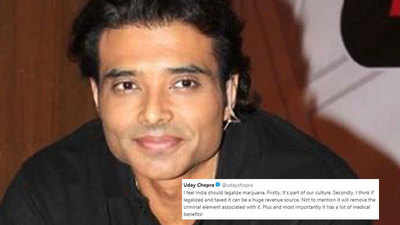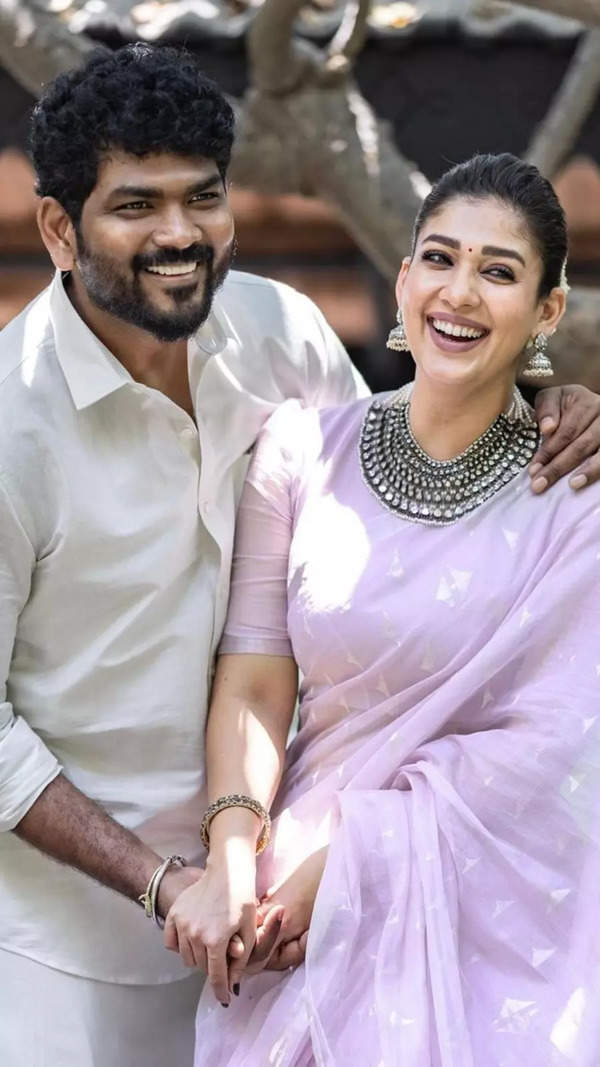- News
- entertainment
- hindi
- bollywood
- Uday Chopra tweets for marijuana, cops cite law
Trending
This story is from September 16, 2018
Uday Chopra tweets for marijuana, cops cite law
Uday Chopra's tweet calling for legalising marijuana in the country elicited a lesson in law from Mumbai police. On Thursday evening, Chopra suggested marijuana should be legalized and taxed as it can be a huge revenue source. "Be mindful, as of now, consumption, possession and transportation of marijuana, invites harsh punishment," Mumbai Police warned the actor.

Key Highlights
- Chopra, who has 1.4 million followers on Twitter, first tweeted on Thursday evening, offering his reasons
- Mumbai Police responded saying: Be mindful, as of now, consumption, possession and transportation of marijuana, invites harsh punishment
MUMBAI: Actor Uday Chopra stirred a debate and controversy on social media by stating that India should legalise the use of marijuana. Tweets were exchanged, some angrily, and Mumbai Police joined in to clarify to Chopra that “consumption, possession and transportation’’ of marijuana invites harsh punishment under the Narcotic Drugs and Psychotropic Substances Act, 1985.
Chopra, who has 1.4 million followers on Twitter, first tweeted on Thursday evening, offering his reasons.“Firstly, it’s part of our culture. Secondly, I think if legalized and taxed it can be a huge revenue source. Not to mention it will remove the criminal element associated with it. Plus and most importantly it has a lot of medical benefits,” he said.
Although cannabis has traditionally been used in India, its cultivation is highly controlled and carried out in mainly the northern states. in his tweets, Chopra said, “…in Holi, Bhaang (similar to marijuana) has been used for centuries. Also, during Mahashivratri many sadhus smoke it in emulation of Shiva. Guess more religion than culture but the two are kind of inter-related.”
In fact, over the last few years, there has been a movement across the US to legalize the use of marijuana not only for medical but even recreational use: 29 states allow its medical use, while nine also allow personal use. Around 14 European countries, Israel, Argentina, Puerto Rico, Panama, Mexico, Zambia and Zimbabwe allow its medical use. But the moot question is whether India will follow the world to allow wider use of marijuana.
Dr Sripad Banavali, dean of academics at Tata Memorial Hospital, Parel, said the marijuana movement across the world was “fizzling out’’. Another senior doctor said there were better formulations for medical pain management than narcotics.
And, Chopra added another tweet for the record: “And no I do not use it. I just really think it’s a wise move, given our history with the plant.”
Mumbai Police took two days to respond to Chopra, saying, “Sir, as citizen of India, you are privileged to express your view on a public platform. Be mindful, as of now, consumption, possession and transportation of marijuana, invites harsh punishment as per provisions of Narcotic Drugs and Psychotropic Substances Act,1985. Spread the Word.”
Joint commissioner of police (law & order) Deven Bharti said, “Mumbai Police is to enforce the law of land. We run awareness campaigns against drugs so that no one falls prey to it. We have been and will be taking harsh action against drug suppliers and peddlers.”
The jury is still out on whether marijuana causes brain/neurological changes. A recent study in the American Journal of Drug Alcohol Abuse said regular users of marijuana showed a decrease in gray matter volume in parts of the brain. “The neuropsychological studies provide evidence for subtle cognitive deficits at least seven days after heavy cannabis use,” the study said.
Chopra, who has 1.4 million followers on Twitter, first tweeted on Thursday evening, offering his reasons.“Firstly, it’s part of our culture. Secondly, I think if legalized and taxed it can be a huge revenue source. Not to mention it will remove the criminal element associated with it. Plus and most importantly it has a lot of medical benefits,” he said.
Although cannabis has traditionally been used in India, its cultivation is highly controlled and carried out in mainly the northern states. in his tweets, Chopra said, “…in Holi, Bhaang (similar to marijuana) has been used for centuries. Also, during Mahashivratri many sadhus smoke it in emulation of Shiva. Guess more religion than culture but the two are kind of inter-related.”
In fact, over the last few years, there has been a movement across the US to legalize the use of marijuana not only for medical but even recreational use: 29 states allow its medical use, while nine also allow personal use. Around 14 European countries, Israel, Argentina, Puerto Rico, Panama, Mexico, Zambia and Zimbabwe allow its medical use. But the moot question is whether India will follow the world to allow wider use of marijuana.
Dr Altaf Patel, director of medicine at Jaslok Hospital and former professor from Grant Medical College in Byculla, pointed out that marijuana is milder and safer than alcohol. “There should be some sort of control, but it’s safe enough to be legalized for medical and personal use.’’
Dr Sripad Banavali, dean of academics at Tata Memorial Hospital, Parel, said the marijuana movement across the world was “fizzling out’’. Another senior doctor said there were better formulations for medical pain management than narcotics.
And, Chopra added another tweet for the record: “And no I do not use it. I just really think it’s a wise move, given our history with the plant.”
Mumbai Police took two days to respond to Chopra, saying, “Sir, as citizen of India, you are privileged to express your view on a public platform. Be mindful, as of now, consumption, possession and transportation of marijuana, invites harsh punishment as per provisions of Narcotic Drugs and Psychotropic Substances Act,1985. Spread the Word.”
Joint commissioner of police (law & order) Deven Bharti said, “Mumbai Police is to enforce the law of land. We run awareness campaigns against drugs so that no one falls prey to it. We have been and will be taking harsh action against drug suppliers and peddlers.”
The jury is still out on whether marijuana causes brain/neurological changes. A recent study in the American Journal of Drug Alcohol Abuse said regular users of marijuana showed a decrease in gray matter volume in parts of the brain. “The neuropsychological studies provide evidence for subtle cognitive deficits at least seven days after heavy cannabis use,” the study said.
End of Article
FOLLOW US ON SOCIAL MEDIA










